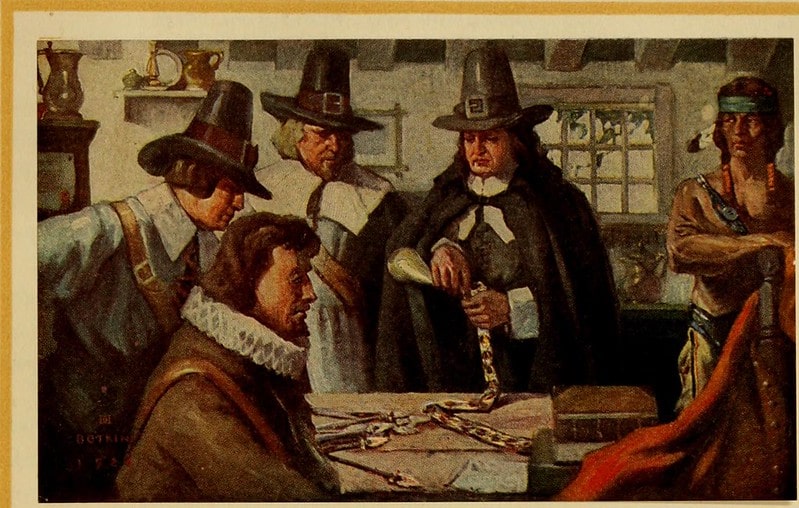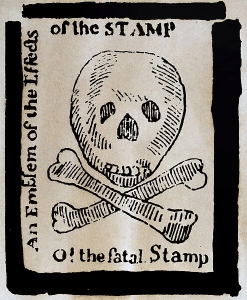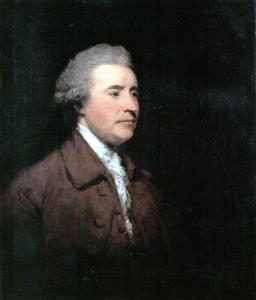Contents
Contents
Salutary neglect was an unofficial policy of Great Britain in the 18th century, whereby its American colonies were largely left to govern themselves, and British laws and regulations, especially those related to foreign trade, were left mostly unenforced.
The term “salutary neglect” was coined by Edmund Burke, an Irish member of the British parliament, in 1775.
Context
The initial settlement of North America by England occurred under a series of royal charters – essentially, a document from the King of England giving authority to settle a certain portion of land in the New World.

Although the Thirteen Colonies were largely democratic, in that male landowners could elect their colony’s leaders, early settlers relied on supply shipments from their home country, and the English had ultimate control.
For example, in 1684, the Crown revoked the Massachusetts Bay Colony’s royal charter, and later put their own colonial governor in place.
The colonists were ultimately loyal to the crown, as many were English, and they held the King in high regard.
However, at the same time, many settled in the Thirteen Colonies to escape religious persecution in England, especially Puritanical Christians. As a result, there was a certain level of cultural separation, and people often resisted British attempts to impose their will, when they considered it unreasonable.
For example, in 1686, after revoking the Massachusetts charter, the British Crown established the Dominion of New England, a consolidation of several colonies under a single governor, Sir Edmund Andros.
This heavy-handed governance led to widespread resentment among colonists, who valued their local autonomy.
The Glorious Revolution in England in 1688, which overthrew King James II, inspired the colonists to arrest Andros and dissolve the Dominion, restoring their previous systems of governance.
Beginning of salutary neglect
After the Glorious Revolution, the colonists enjoyed greater autonomy than they had before, especially when it came to international trade.
The Navigation Acts (1651-1696) mandated that colonies trade primarily with Britain and use British ships, under a policy known as mercantilism.

Officially, the British viewpoint was that strictly regulating colonial trade would enrich British merchants, and increase taxation revenue. In their view, the purpose of having overseas colonies was to enrich the British Empire, and the colonies must contribute directly towards this.
However, enforcement of the Navigation Acts was weak, and from 1700 in particular, other trade regulations were also mostly ignored by British customs authorities, for a number of reasons:
- The physical distance between Britain and its American colonies made direct governance challenging, and expensive.
- The English were preoccupied with internal politics and conflicts, such as the War of the Spanish Succession, the War of the Austrian Succession, and later the Seven Years’ War. They had other financial and political priorities that were more important than the often difficult enforcement of colonial trade law.
- The colonies were profitable under the system of salutary neglect, providing raw materials to Britain and consuming British goods without requiring strict oversight. At the time, Robert Walpole, Commissioner of the Treasury in the British government, did not believe in enforcing trade restrictions such as the Navigation Acts. He stated that the colonial economy would flourish and deliver better economic results for the British if merchants could trade freely with foreign territories, such as French and Dutch colonies in the Caribbean.
Examples of laws left unenforced
Apart from the Navigation Acts, a number of other British laws were left unenforced during salutary neglect:
- The Molasses Act (1733): imposed a high tax on molasses, sugar, and rum imported from non-British colonies (particularly in the French and Dutch West Indies) to encourage trade with British West Indian planters. The law was mostly ignored, as goods were illegally smuggled in, and customs officers were easily bribed to avoid the tax.
- The Wool Act (1699): prohibited the export of wool and woolen goods from the colonies to prevent competition with British manufacturers. Colonists circumvented this by producing wool locally for local markets or smuggling it abroad.
- The Hat Act (1732): restricted the manufacture and export of hats in the colonies to limit competition with British hat makers. Colonial hat-making persisted, especially for local markets, without significant enforcement.
- The Currency Acts (various, including 1751 and 1764): prohibited colonies from issuing their own paper money, and forced devaluation of existing currency to protect British creditors. Enforcement varied, and many colonies issued paper currency regardless of the regulations.
In addition, British authorities often imposed rules limiting town meetings or other forms of colonial political organization. These laws, when in effect, colonists largely ignored.
Effects
Salutary neglect allowed the Thirteen Colonies to grow their economies significantly through trade with foreign partners.
The rum and timber industries in New England thrived, as local pine trees were not reserved for use on British Navy ships like they were supposed to be. Agriculture and manufacturing also thrived, for example through the export of cash crops such as tobacco in the southern colonies.
Politically, the lack of enforcement strengthened colonial frameworks of self-governance and local decision-making, which became a foundation for later independence efforts.
Crucially, salutary neglect gave the colonies a much stronger sense of political and economic independence. Arguably, this was a significant contributing factor in the colonists’ decision to resist later British efforts to tax the citizens of their overseas territories, without offering political representation in exchange.
End of salutary neglect
After the conclusion of the French and Indian War, the British ended their unofficial policy of salutary neglect.
- Enforcement of the Navigation Acts restarted, to prevent colonial trade with foreign merchants.
- New taxes were introduced in the colonies, such as the Stamp Act, Sugar Act, and Townshend Acts.
- The Proclamation of 1763 restricted the colonists from expanding their settlements westwards, leading to frustration among colonists who had hoped to settle the fertile lands beyond the Appalachian Mountains.
Salutary neglect ended because at last, the British had the time and resources to pay more attention to their American colonies, and enforce mercantilist trade policies.
The French and Indian War was extremely expensive for the British. By introducing new taxes on the colonists, and stimulating trade with British merchants, the government wanted to raise taxation revenue to help pay off the war debt.
The colonial reaction to the end of salutary neglect was severe.

After having enjoyed significant autonomy over the last 50-75 years, the new regulations and stronger enforcement were a shock to the system.
The colonists believed that it was unconstitutional for the British to levy taxes against them, without offering representation in British parliament.
They also felt it unfair that they had to help repay the British war debt, despite having already contributed significantly to the war effort – not to mention, the damage the war did to the economy of the Thirteen Colonies.
The end of salutary neglect marked the beginning of the conflict between the Thirteen Colonies and Great Britain, which would eventually lead to the American Revolution.


